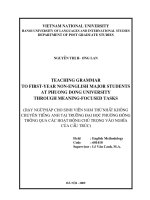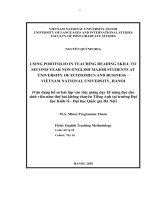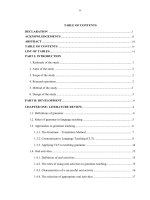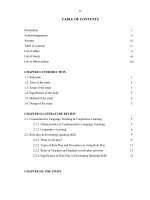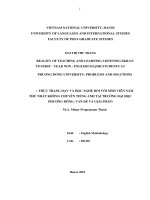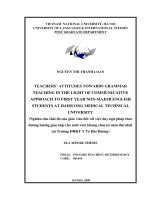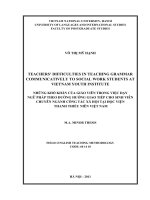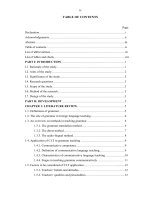Việc sử dụng các hoạt động nói để dạy ngữ pháp theo đường hướng giao tiếp cho sinh viên năm thứ nhất không chuyên tiếng Anh trường Đại học Thương Mại tt.PDF
Bạn đang xem bản rút gọn của tài liệu. Xem và tải ngay bản đầy đủ của tài liệu tại đây (476.44 KB, 17 trang )
VIETNAM NATIONAL UNIVERSITY, HANOI
UNIVERSITY OF LANGUAGES AND INTERNATIONAL STUDIES
FACULTY OF POST – GRADUATE STUDIES
TRẦN THỊ THU HIỀN
USING ORAL ACTIVITIES TO TEACH GRAMMAR
COMMUNICATIVELY TO FIRST YEAR NON ENGLISH
MAJOR STUDENTS AT VIETNAM UNIVERSITY OF
COMMERCE
(VIỆC SỬ DỤNG CÁC HOẠT ĐỘNG NÓI ĐỂ DẠY NGỮ PHÁP THEO ĐƯỜNG HƯỚNG
GIAO TIẾP CHO SINH VIÊN NĂM THỨ NHẤT KHÔNG CHUYÊN TIẾNG ANH
TRƯỜNG ĐẠI HỌC THƯƠNG MẠI)
M.A. MINOR PROGRAMME THESIS
Field: English Teaching Methodology
Code: 601410
HÀ NỘI, 2011
VIETNAM NATIONAL UNIVERSITY, HANOI
UNIVERSITY OF LANGUAGES AND INTERNATIONAL STUDIES
FACULTY OF POST – GRADUATE STUDIES
TRẦN THỊ THU HIỀN
USING ORAL ACTIVITIES TO TEACH GRAMMAR
COMMUNICATIVELY TO FIRST YEAR NON ENGLISH
MAJOR STUDENTS AT VIETNAM UNIVERSITY OF
COMMERCE
(VIỆC SỬ DỤNG CÁC HOẠT ĐỘNG NÓI ĐỂ DẠY NGỮ PHÁP THEO ĐƯỜNG HƯỚNG
GIAO TIẾP CHO SINH VIÊN NĂM THỨ NHẤT KHÔNG CHUYÊN TIẾNG ANH
TRƯỜNG ĐẠI HỌC THƯƠNG MẠI)
M.A. MINOR PROGRAMME THESIS
Field: English Teaching Methodology
Code: 601410
Supervisor: Nguyễn Thu Lệ Hằng, M.A.
HÀ NỘI, 2011
iv
TABLE OF CONTENTS
DECLARATION …i
ACKNOWLEDGEMENTS …ii
ABSTRACT …iii
TABLE OF CONTENTS …iv
LIST OF TABLES …vi
PART I: INTRODUCTION
1. Rationale of the study …1
2. Aims of the study …2
3. Scope of the study …2
4. Research questions …2
5. Method of the study…………… 3
6. Design of the study …3
PART II: DEVELOPMENT ….4
CHAPTER ONE: LITERATURE REVIEW …4
1.1. Definitions of grammar ….4
1.2. Roles of grammar in language teaching …5
1.3. Approaches to grammar teaching …6
1.3.1. The Grammar – Translation Method …7
1.3.2. Communicative Language Teaching (CLT) …8
1.3.3. Applying CLT to teaching grammar …14
1.4. Oral activities …15
1.4.1. Definition of oral activities …15
1.4.2. The roles of using oral activities in grammar teaching …15
1.4.3. Characteristics of a successful oral activity …16
1.4.4. The selection of appropriate oral activities …17
v
1.5. Conclusion …21
CHAPTER TWO: THE STUDY …22
2.1. The research hypothesis …22
2.2. Methodology …22
2.3. Participants and instruments …23
2.3.1. Participants …23
2.3.2. Instruments …23
2.4. Procedure of data collection …24
2.5. Results and discussion …25
2.5.1. Current situation of using oral activities to teach grammar communicatively
to first year non English majors in Vietnam University of Commerce …25
2.5.2. Problems in using oral activities to teach grammar communicatively to first
year non English majors in Vietnam University of Commerce 32
2.5.3. Suggested solutions …34
PART III: CONCLUSION …40
1. Summary of the study …40
2. Implications …40
3. Limitations of the study …41
4. Suggestions for further studies …42
REFERENCES …43
APPENDICES…………………………………………………………………………… I
1
PART ONE: INTRODUCTION
1. Rationale of the study
Over the past few years, the application of the Communicative Language Teaching method
has been widely adopted. This marked the beginning of a major change in the language
teaching and learning at VCU. And students’ grammar as well as communicative ability
has been improved remarkably.
VCU Faculty of English has been newly established for 4 years. Almost all of the teachers
were trained about CLT approach at the University and they fully understood the
importance of communicative grammar lessons among students. Therefore, they made all
their effort to apply many kinds of activities in grammar lessons to encourage students to
communicate in studying grammar in classroom.
As a teacher in the Faculty of English at VCU, from my own observations and experience,
I have noticed that there are many ways to motivate the first year non-major students in
grammar lessons. Among them, the use of oral or speaking activities has been received
more emphasis. Nevertheless, both teachers and students have faced a lot of challenges in
implementing and managing oral activities in grammar lessons. For example, the
classroom is too noisy, teachers sometimes lose control of the class or students tend to
switch to use their mother tongue when not under the teacher’s eyes and so on. Moreover,
the teachers’ procedure in organizing speaking activities in grammar lessons is not very
effective.
The above mentioned situation has urged me to conduct a study to investigate teachers’
and students’ difficulties in implementing oral activities, teachers’ oral activities
organization procedure, and teachers’ strategies to foster students’ English grammar. As a
result, I have decided to carry out the research into “Using oral activities to teach
grammar communicatively for first year non English major students in Vietnam University
of Commerce”. This study is intended to make a modest contribution to an increased
understanding of using oral activities in the grammar lesson at VCU.
2. Aims of the study
The purpose of this study is to explore the reality of the use of speaking activities in the
grammar lesson of 1
st
year students of Economics, Finance and Banking at VCU where the
researcher is serving. More specifically, this study attempts to clarify the procedures of
organizing speaking activities in the grammar lesson of 1
st
year non English major students
2
and to identify strategies used by teachers to stimulate students’ communicative
competence in grammar learning and the factors bringing about difficulties for the teachers
and students in their application of oral activities. One additional aim is to compare
teachers’ practice with students’ expectation. Based on the findings, the research further
seeks to suggest practical recommendations for the possibility of using speaking activities
in grammar lessons of 1
st
year non English major students at VCU.
3. Scope of the study
Though oral activities are usually applied in the speaking skill, I have chosen to focus on
grammar lessons for the fact that grammar is the first thing that learners learn on the first
day of an English lesson for non English major departments. Moreover, the purpose of
studying English of English non English major students at VCU is to gain an international
certificate in communication, for instance, the TOEIC test. Therefore, this research tends to
investigate the use of oral activities in the grammar lesson. Also, due to the time
constraints, this study only involves a small number of VCU teachers and Economics,
Finance and Banking students in their first year.
4. Research questions
In order to achieve the set goals, the research seeks to answer the following research
questions:
- To what degree have oral activities been applied in teaching grammar communicatively
to first year non English majors in Vietnam University of Commerce?
- What problems do teachers meet when using oral activities to teach grammar
communicatively to first year non English major in VCU?
- What are the possible solutions to these problems as suggested by the teachers atVCU?
5. Method of the study
The main method of the study was survey questionnaire, in which two types of
questionnaire are designed and distributed to the learners and the teachers. Furthermore, in
order to evaluate the effectiveness of the suggested approach, the writer collected some
information based on her informal interviews to make sure that the data is more accurate
and reliable.
A combination of different methods above will provide reliable data, based on which the
conclusions and suggestions will be made in the next parts.
3
6. Design of the study
The study consists of three main parts:
The first part, Introduction, provides an overview of the study in which the reasons for
choosing the study will be focused. It also includes the aim, research questions, research
methods, scope and design of the study.
The second part, Development, consists of two chapters:
Chapter one, Literature Review, provides the theoretical background for the thesis. This
chapter includes three main points. The first point deals with the general view on grammar
and grammar teaching approaches. The second point discusses the problems. Finally, the
third point discusses the need for applying oral activities to grammar teaching.
Chapter two, The Study, aims to describe background information about the current
teaching and learning of grammar at VCU and presents the methodology underlying the
research including data collection instruments, procedures. A detailed data analysis and
discussions are also given.
The last part, Conclusion, gives a summary and a recommendation for further study.
4
PART TWO: DEVELOPMENT
CHAPTER ONE: LITERATURE REVIEW
This chapter aims to explore a general view on grammar, grammar teaching in some
English teaching approaches, problems in teaching grammar at VCU, and oral activities
application to grammar teaching.
1.1. Definitions of grammar
In the foreign language teaching context, grammar is the first thing that learners learn on
the first day of an English lesson. Grammar is often defined as the study of how words and
their component parts combine to form sentences. However, that is only the way traditional
grammarians see grammar. Other linguistic schools have their own definitions basing on
their different interest. Structural linguistic might see grammar as the sum total of sentence
patterns in which the words of a particular language are arranged. In addition, grammar is
regarded as our innate knowledge of the structure of language by cognitive linguistics.
1.2. Roles of grammar in language teaching
In the language teaching field, teaching and learning grammar is appreciated incorrectly
and inexactly. Sometimes it is thought to be very boring because the teachers and learners
always follow the old trace, that is, learning terminology, memorizing rules, doing
mechanical exercises, such as sentence patterns and further practice. As Hopkins et al
(1994: 157) assumes that it is boring to teach grammar but hardly any teachers ignore it
completely. Grammarians do give strong support to grammar teaching. They think
grammar gives us a means to understand a language. Besides, it reflects the order of the
human thoughts and helps us to understand the diversity of human culture. For them, the
acquisition of the grammatical system of a language remains the most important element in
language teaching.
1.3. Approaches to grammar teaching
In the history of language teaching methodology, it can be said that grammar goes closely
together with the development of teaching methods and approaches. Grammar was once
the focus of the earliest method – Grammar Translation and until now the tremendous
change in methodology have always implied the changes in grammar teaching objective,
techniques and activities. The following part is about some of the most common methods
and approaches in which the grammar teaching will be concerned.
1.3.1. The Grammar – Translation Method
5
This method is associated with the learning of Latin and Greek which was popular in the
late 18
th
century in Europe and considered to be the key to the thought and literature of a
great and ancient civilization. The primary aim of this method is to engage the learners in
mental gymnastics and to read literature and philosophy in the target language. Also, it
focuses on grammatical rules, rote memorization of vocabulary and translation of literary
texts.
1.3.2. Communicative Language Teaching (CLT)
Towards the end of the 1960s there was a growing dissatisfaction among applied linguists
and foreign language teachers with the language theories and teaching methods. The
prominent American linguist Noam Chomsky had demonstrated that the current standard
structural theories of language were incapable of accounting for the fundamental
characteristic of language – the creativity and uniqueness of individual sentences. Besides,
applied linguists emphasized a fundamental dimension of language that was inadequately
addressed in approaches to language teaching at that time – the functional and
communicative potential of language. Consequently, the teaching produced structurally
competent students who were often communicatively incompetent. Communicative
Language Teaching (CLT) emerged as a response to that judgment. It is based on the
language theory that language is for communication and the learning theory that real
communication, meaningful task and meaningful language promote learning. The term
CLT covers a variety of approaches that all focus on helping learners to communicate
meaningfully in the target language.
1.3.3. Applying CLT to teaching grammar
According to Siaw-Fong Chung (2005) since the introduction of Communicative Language
Teaching (CLT), many textbooks have been written to incorporate communicative
activities, authentic materials and personalized contexts, but where the teaching and
learning of grammar is concerned, most textbooks do not reflect CLT principles.
Obviously, applying CLT to grammar teaching is necessary in order to deal with the
disadvantages of Grammar Translation method when being used to teach grammar such as
the learners’ inappropriate utterances and passive learning style. The deep basis of this
application is that CLT aims at developing communicative competence and grammatical
competence is one of four of its component competences. Thus, in theory, CLT may be
used to teach grammar so that understanding the rules of grammar is not an end in itself
and learners are helped to recognize the communicative value of grammatical structures.
6
1.4. Oral activities
1.4.1. Definition of oral activities
A grammar lesson consists of different stages which are suggested differently by different
methodologists. Ur (1996) organizes grammar teaching into four stages: presentation,
isolation and explanation, practice and test, whereas according to Celce-Murcia and Hilles,
a grammar lesson goes through four following phases: presentation, practice and testing.
Thus, however different such suggestions are, practice as a stage is always present, it
comes after the initial presentation and explanation when learners have taken knowledge
into short term memory but have not really mastered it yet. Practice may be defined as any
kind of engaging with the language on the part of the learners, usually under the teachers’
supervision, whose primary objective is to consolidate learning. Practice involves both
spoken and written practice (Ur, 1996:11).
1.4.2. The roles of using oral activities in grammar teaching
Nunan (2007) agrees that oral grammar practice gives learners increasing opportunities and
motivation to interact with other communicators, to raise their awareness of the forms and
functions of English grammar. Grammatical patterns are matched to particular
communicative meanings so learners can see connection between form and function.
Learners learn how to choose the right pattern to express different communicative
meanings. They will incorporate various grammatical structures in their performance.
Students, for successful language use, need not only to be exposed to the structures and
functions of communication but also to practice applying grammatical knowledge in real
contexts. To reach the goals, the application of grammar in the classroom should be more
creative and open-ended. Creative language activities provide more opportunities for the
learners to use language more flexibility than receptive language tasks. Creative language
use involves learners in recombining familiar words, phrases and structures in new and
familiar ways. When students have enough time and enough opportunities communicate
and to receive feedback on attempts at producing meaningful language, errors will
gradually diminish (Corder, 1981; Selinker, 1972, 1992). Thanks to that students will learn
grammar better.
1.4.3. Characteristics of a successful oral activity
7
According to Ur (1996: 120), a successful oral activity consists of the following
characteristics:
A lot of learners talk: learners speak as much as possible during the period of time
allowed. Time taken up with the teacher talk or pauses is minimized.
Even participation: every learner takes part in the speaking activity. The
participants’ contributions are fairly distributed.
High motivation: The topic makes them interested and eager to speak or learners
want to fulfill the task to get the goal.
An acceptable language level: Learners use relevant and comprehensible
expressions. Language accuracy is of an acceptable level.
1.4.4. The selection of appropriate oral activities
Many researchers discuss classroom activities and a lot of activities are adapted or
designed based on the theory and characteristics of CLT.
Littlewood (1981) distinguishes between “functional communication activities” and “social
interaction activities”. In his views, the former includes such tasks as learners noting
similarities or differences in sets of pictures, discovering missing features in a map or
picture, one learner communicating behind a screen to another learner and giving
instructions on how to draw a picture or shape, or how to complete a map, following
directions, and solving problems from shared cues. The latter includes conversation and
discussion and sessions, dialogues and role-plays, simulations, and improvisations and
debates.
Conversation
Conversation serves many functions. People use conversations to establish relationships
through personal expression, to find out information, and to compare views with others.
Conversation provides a means for sharing experiences and solving problems.
Discussion
Discussion differs from conversation in that it generally has an identifiable purpose, such
as coming to a clearer understanding of characters’ roles in a drama or exploring the
possibilities for publishing student writing. Discussion is similar to conversation with
regard to listening carefully, considering what others say, being courteous, and speaking so
that all can hear. Many of students’ conversational abilities will transfer to discussion
situations.
8
Storytelling
Storytelling is an oral sharing of a personal or traditional story, told using the essence of
the tradition from which it originates. As a shared experience between teller and listener, it
offers natural language experiences for students.
Oral reports
In preparing reports, students develop the ability to select material appropriate to
classroom topics and to the audience, and the ability to collect and organize material
(requiring skill in reading critically, taking notes, summarizing and outlining). Often a
report can be made more meaningful to the audience through the use of visuals such as
charts, maps, diagrams, and overhead transparencies.
Telephoning
The telephone is an important tool for personal, school, and business use because of the
rapid communication it permits. Therefore, there is need to reinforce personal speaking and
listening abilities regarding telephone use.
Announcements
Making announcements can serve as useful oral speaking practice at any grade level. As
with other types of speech activities, criteria for making announcements should be
developed by the class. These criteria should address the recommended format and manner
of presentation and serve as guidelines for the students.
Role play
Role play provides the opportunity for students to develop and revise their understanding
and perspectives by exploring thoughts and feelings of characters in given situations. The
teacher may take a role, becoming an active participant in promoting independent thinking
and co-operate learning.
Interviews
An interview is a good way to gain information and provide the participants with practice
in improving speaking and listening skills. Results of interviews can be prepared for
publication in reports or in the school newspaper, thus supporting the writing component of
the language arts program.
Informal Debate
Students who participate in debates have an opportunity to explore, listen, and enjoy
learning. Debates give students additional opportunities to hear their classmates’ views and
to express opinions regarding topics that matter to them. They also help students make
9
important decisions and become critical listeners. The informal debate helps students to
work together to understand common problems.
Co-operative learning
Co-operative learning involves students in group collaboration in order to achieve a goal or
to complete a project. Although students do not necessarily work together at one table
throughout the project, participation by each group member is necessary to accomplish the
task. Success and assessment are based on the performance of the group, as well as on
individual contributions and performance within the group.
1.5. Conclusion
Briefly, this chapter presents the literature related to the study. Not only the definition, the
role of oral activities in grammar teaching as well as the characteristics of an oral activity,
but Communicative Language Teaching approach and some other approaches are also
viewed to figure out the most suitable techniques for effective English grammar lessons.
Applying these techniques, the researcher wishes to discover how oral activities can help to
teach grammar communicatively to the first year English non-major students in Vietnam
University of Commerce.
CHAPTER TWO: THE STUDY
2.1. The research context
10
The study was conducted at VCU where students come from all parts of Vietnam. The
students experienced traditional method of English teaching at high schools and learning
used to focus on reading and writing but not listening or speaking. Thus, they had very few
chances to speak English. In fact, the first year non major students of English find the
University learning style completely different and they find it difficult to join classroom
activities. However, this study is carried out in the second semester when the students have
passed the first semester and are quite familiar to communicative grammar. Moreover, they
are active, enthusiastic and hard working in the study, which has encouraged the teachers
of English to keep looking for way to help them improve their studying.
2.2. Methodology
Nowadays, it is increasingly common for researchers to report the study on both
quantitative and qualitative findings, especially, in studies on English Second Language
(ESL) (Adams, Fujii & Mackey, 2005). Thus, in consideration of the research’s purposes,
this study was done in the light of both quantitative and qualitative research in which the
data is collected by means of questionnaires and interviews of both teachers and students.
2.3. Participants and instruments
2.3.1. Participants
The subjects of this study consist of two groups. The first group includes 150 first year
students majoring in Economics and Finance & Banking. The other consists of 10 English
teachers of Theoretical Department, English Faculty, VCU. The students age from 18 to
22, 54% are male and 46% are female. Some of them have learnt English for 6 years and
the others for 3 years or fewer. Among the teachers, 4 have a Master degree, 3 are
attending M.A. courses and 3 graduated from the University of Languages and
International Studies of Vietnam National University. They all age from 24 to 40 and have
at least 2 years teaching experience.
2.3.2. Instruments
2.3.2.1. Questionnaires
The study employs two questionnaires, one for teachers and the other for students.
The questionnaire for teachers, adapted from Mueller (1997), written in Vietnamese
consisting of 4 questions was delivered to 10 teachers who were teaching English for the
first year students at VCU. The questionnaire was used to explore information about their
11
attitudes towards their degree of using oral activities, their difficulties in organizing oral
activities during grammar lessons as well as the solutions they have applied when using
these oral activities to teach grammar communicatively.
2.3.2.2. Interviews
Another research tool employed in this study was private interviews. The interviews with
teachers were carried out (5 items for the teachers) to get more information about the
difficulties they coped with when using oral activities in teaching grammar
communicatively and some solutions they offered to deal with these difficulties. These
questions were open enough to allow the interviewees to comfortably express their
thoughts, feelings or opinions. Before officially carrying out the interviews, the interview
questions were piloted with one teacher to identify the potential problems.
2.4. Procedure of data collection
In the first phase, questionnaires were administered to 150 first year students in Economics
and Finance & Banking at the end of the second semester of the academic year 2011. The
participants were asked to complete the questionnaire at home and returned their responses
one week later so that they would have as much time as they needed.
2.5. Results and discussion
2.5.1. Current situation of using oral activities to teach grammar communicatively to
first year English non-majors in Vietnam University of Commerce
The presented and analyzed data was taken from two questionnaires for both Teachers and
Students at VCU and interviews for Teachers at VCU.
2.5.2. Problems in using oral activities to teach grammar communicatively to first
year English non-majors in Vietnam University of Commerce
2.5.3. Suggested solutions
2.5.3.1. Survey Questionnaires
To improve the effectiveness of teaching grammar through oral activities, evaluation of
oral activities was carried out by both students and teachers. Their evaluations are
necessary in choosing, adapting and designing the oral activities.
2.5.3.2. Interviews
Solutions to Problem 1: Limited time allowance
Solutions to Problem 2: Passive students
12
Solutions to Problem 3: Unqualified students
Solutions to Problem 4: Boring grammar course book
Solutions to Problem 5: Class management
PART THREE: CONCLUSION
1. Summary of the study
13
This research was presented with the aims to investigate the problems of using oral
activities in teaching grammar communicatively. The research was based on the survey
questionnaires and interviews.
2. Implications
With all the findings and discussions presented in the previous sections, this part will offer
some suggestions for the teachers who are teaching grammar to English non-major
students in Vietnamese University in general, and at VCU in particular.
3. Limitations of the study
Due to the lack of time, the data was only collected through one main instrument, with
questionnaire, supported by opinions gathered from short informal interviews with the
teachers. Therefore the result of this study may only reflect a part of situation of using oral
activities in teaching grammar communicatively. There are many things that need
considering and investigating thoroughly. Mistakes and shortcomings are unavoidable so
any comments or extra contributions are welcome.
4. Suggestions for further studies
Using oral activities in teaching grammar still remains a wide room to study. Further
research may focus on other subjects like high school students. As for a field of exploiting
oral activities in learning and teaching grammar, the researcher would suggest that research
on developing an item bank of oral activities for a particular textbook would contribute to
deal with the shortage of applicable materials for teachers.
